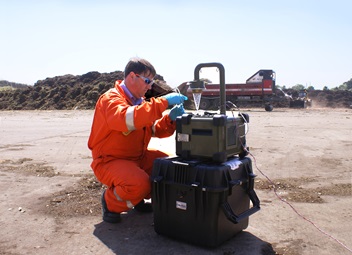Trials conducted by the National Physical Laboratory (NPL) have identified improved methodologies for sampling and measuring bioaerosols at composting facilities.
Commissioned by Defra, the first project began in 2008 and the results of a larger series of trials will be published later this summer.
As the UK seeks to reduce the quantity of waste going to landfill, there has been a growth in demand for composting, particularly to accommodate ‘green bin’ waste. In addition there has been an increase in the variety of wastes that are being composted, so it is important to be able to understand the emissions from these processes in order to minimise any impact on the environment and human health.
Micro-organisms are necessary for the composting process, so they will always be present in large quantities within the bulk material. Any handling process, such as moving, sorting or turning, is likely to create airborne dust that will contain micro-organisms, and studies have shown that exposure to the pathogenic fungus Aspergillus fumigatus can trigger asthma, bronchitis and allergic responses, so workers and residents near composting sites are potentially at risk.
 Coriolis sampler.
Coriolis sampler.
Traditional bioaerosol sampling techniques rely on the impaction of particles on a solid agar medium. However, these methods can be time-consuming and are limited by low flow rates and unreliable impaction. They are also restricted to particles that can be cultivated. In contrast, the wet walled cyclonic technology employed by the Coriolis instruments, rapidly collects biological particles in liquid at a high flow rate with validated efficiency, and the liquid containing the particles is compatible with a number of rapid microbiological analysis methods, including qPCR (quantitative polymerase chain reaction), which enables the quantification and qualification of most targets.
Studies at NPL
The objective of the initial work was to improve the accuracy and speed of traditional measurement techniques, and one of the conclusions of the project was that the wet walled cyclonic technology employed by the Coriolis, gave the best performance for quantifying biological species such as fungi and bacteria, when used in conjunction with qPCR. Some of the experimental work was carried out at the Health Protection Agency (HPA) to quantify the efficiency of sampling and analysis methods for the measurement of airborne Aspergillus fumigatus spores. This work demonstrated good correlation between Coriolis/qPCR and the HPA’s ‘standard’ method for these measurements.
As a result of the initial work, NPL now offers an Aspergillus fumigatus bioaerosol monitoring service to quantify airborne spore levels at composting sites using a rapid qPCR technique. The key advantages of this monitoring service over traditional microbiological methods are:
1. Short sampling times
2. Rapid analysis
3. High sensitivity and broad detection range
4. Species specific
5. Detects total spore count (viable and non-viable), which overcomes any issue of emission underestimation as a result of damage to the spores during collection
6. Aids differentiation between background spore levels and site specific emission
A full report in the early work has now been published on the Defra website, and further studies have been commissioned. The most recent studies have involved bioaerosol sampling with the Coriolis sampler at four different sites, every quarter during 2012. NPL’s David Butterfield says “The objective of the latest trial was to assess the sampling and monitoring technologies in greater detail, under differing weather conditions and with different sources.”
At the same time, a working group at CEN, the European Committee for Standardisation, is working on a new bioaerosol monitoring standard that is likely to accommodate the latest technology and will necessitate demonstration of equivalence.
Looking forward, Jim Mills from Air Monitors, the company which launched the Coriolis in the UK, says “It will take some time before this new technology becomes standard practice, but in the meantime, with the benefit of the work that has been conducted by NPL and others, there is no reason why Coriolis should not be utilised widely to improve the efficiency and effectiveness of bioaerosol sampling at composting sites, and in many other applications such as hospitals, legionella investigations, cooling towers, animal housing and pharmaceutical manufacture.”
Based in the UK, Air Monitors is an independent, privately owned company representing some of the world's leading environmental monitoring technology manufacturers. Providing monitoring solutions which encompass the very best products, technology and services, Air Monitors offers technical support, maintenance, calibration, operation, analysis and reporting services in addition to the sale or hire of monitoring equipment. Typical applications include the monitoring of particulate matter and gaseous pollutants in both workplace and ambient air.